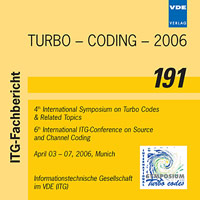On Parity-Check Matrices with Optimal Stopping and/or Dead- End Set Enumerators
Conference: TURBO - CODING - 2006 - 4th International Symposium on Turbo Codes & Related Topics; 6th International ITG-Conference on Source and Channel Coding
04/03/2006 - 04/07/2006 at Munich, Germany
Proceedings: TURBO - CODING - 2006
Pages: 6Language: englishTyp: PDF
Personal VDE Members are entitled to a 10% discount on this title
Authors:
Abdel-Ghaffar, Khaled A. S. (Dept. Electrical and Computer Engng., University of California, Davis, CA 95616, USA)
Weber, Jos H. (Delft University of Technology, Mekelweg 4, 2628 CD Delft, The Netherlands)
Abstract:
The performance of iterative decoding techniques for linear block codes correcting erasures depends very much on the sizes of the stopping sets associated with the underlying Tanner graph, or, equivalently, the parity-check matrix representing the code. In this paper, we introduce the notion of dead-end sets to explicitly demonstrate this dependency. The choice of the parity-check matrix entails a trade-off between performance and complexity. We give bounds on the complexity of iterative decoders achieving optimal performance in terms of the sizes of the underlying parity-check matrices. Further, we fully characterize codes for which the optimal stopping set enumerator equals the weight enumerator.


